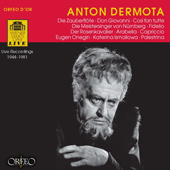Hans Swarowsky
Hans Swarowsky studied music in Vienna: theory and composition with Schoenberg and Webern, conducting with Clemens Krauss, Richard Strauss and Felix Weingartner, and piano with Eduard Steuermann, as well as with Busoni. He then held a succession of conducting posts in various opera houses across Europe: Stuttgart, Hamburg (from 1932) and Berlin (from 1934), but was banned from conducting in Germany by the Nazi government between 1936 and 1945. As a result he conducted abroad, with the Zürich Opera from 1937 to 1940 and with the Polish Philharmonic Orchestra in Kraków during 1944, and worked in opera management in Munich and with the Salzburg Festival, as well as assisting Richard Strauss on the libretto of his final opera, Capriccio. Following the end of World War II he conducted Richard Strauss’s Der Rosenkavalier at the 1946 Salzburg Festival, and served as conductor of the Vienna Symphony Orchestra between 1946 and 1948. From 1948 to 1950 he was chief conductor of the Graz Opera and during the early 1950s he was active as a guest conductor and in the recording studios of Vienna. Swarowsky was appointed permanent conductor at the Vienna State Opera by Herbert von Karajan in 1957 and remained active in this opera house until his death, offering stylish and faithful performances of the core repertoire. He succeeded his fellow Schoenberg pupil Karl Rankl as chief conductor of the Scottish National Orchestra (1957–1959). From 1946 he led the conducting class at the Vienna Academy of Music, his students including many of the major figures of the generation which made its mark during the 1960s and 1970s, such as Claudio Abbado, Adam and Iván Fischer, Mariss Jansons, Jesús Lopez-Cobos, Zubin Mehta, Peter Schneider and Giuseppe Sinopoli.
Swarowsky recorded extensively for many minor budget labels, such as Audio Fidelity, Concert Hall, the Haydn Society, Supraphon, Urania, Vanguard, and Vox, often with the Orchestra of the Vienna State Opera and the Vienna Symphony Orchestra (also known for contractual reasons as the Pro Musica Symphony Orchestra of Vienna), as well as for the American Recording Society’s series Music Treasures of the World, which was sold in American grocery shops with anonymous performer attributions. In addition the German conductor, record producer and entrepreneur Alfred Scholz falsely attributed to Swarowsky, who had taught him conducting, numerous recordings (for instance of Bruckner symphonies) with the South German Philharmonic Orchestra, a recording orchestra made up largely of musicians from Prague and Bamberg. To confuse matters, Swarowsky did actually make several legitimate recordings with this orchestra, for instance complete accounts of Wagner’s Lohengrin and Der Ring des Nibelungen, during the Czech-Russian crisis of 1968. Thus Swarowsky’s reputation has suffered through his association with inexpensive records, generally available at the bottom end of the market, and in certain cases with recordings which he in fact did not himself conduct.
However a closer examination of his legitimate recordings reveals a conductor with a strong sense of musical architecture and of appropriate style. His recordings of music by Mozart, such as his early post-war recording of Mozart’s Don Giovanni with Mariano Stabile in the title role, and his recordings of several of the piano concertos with for instance Friedrich Gulda and Dennis Matthews, all reveal a notable stylist; while his symphonic recordings, such as those of Saint-Saëns’s Symphony No. 3 ‘Organ’, and Tchaikovsky’s Symphonies Nos 1, 2 and 3, display a lively momentum and a sure placing of climaxes. Perhaps his finest recordings were those made towards the end of his life with the Czech Philharmonic Orchestra, in repertoire which included Mahler’s Symphony No. 4, Schoenberg’s Pelleas und Melisande, and Webern’s Passacaglia, all works with which Swarowsky was intimately familiar.
© Naxos Rights International Ltd. — David Patmore (A–Z of Conductors, Naxos 8.558087–90).

















